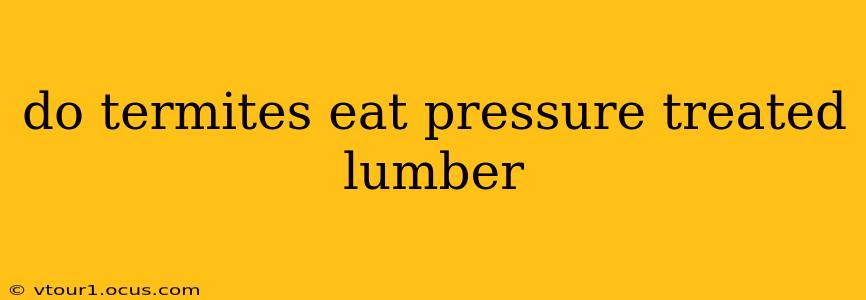Termites are notorious for causing significant damage to wooden structures, leading many homeowners to wonder: do termites eat pressure treated lumber? The short answer is more nuanced than a simple yes or no. While pressure-treated lumber is designed to deter termite infestation, it's not entirely immune. Understanding the specifics of pressure treatment and termite behavior is key to protecting your property.
What is Pressure Treated Lumber?
Pressure-treated lumber undergoes a process where preservatives are forced deep into the wood under high pressure. These preservatives, typically containing copper, chromium, and arsenic (CCA), or other less toxic alternatives like alkaline copper quaternary (ACQ) or copper azole (CA-B), protect the wood from decay and insect damage, including termites. The effectiveness of the treatment depends on several factors, including the type of preservative used, the concentration of the preservative, and the duration of the treatment.
Do Termites Avoid Pressure Treated Lumber Completely?
While pressure-treated lumber significantly reduces the risk of termite infestation, it doesn't guarantee complete protection. Here's why:
- Type of Preservative: Older CCA-treated lumber, while effective, contained arsenic, which is now largely phased out due to environmental concerns. Newer ACQ and CA-B treated lumber are considered less toxic but may offer slightly less protection against some termite species.
- Level of Treatment: The amount of preservative injected into the wood is crucial. Lumber treated to a higher standard will offer better protection. This information is usually marked on the lumber itself.
- Termite Species: Different termite species exhibit varying levels of resistance to preservatives. Some may still be able to feed on even heavily treated lumber, particularly if the treatment is compromised or the wood is already damaged.
- Condition of the Wood: Cracks, splits, or other damage to the treated lumber can create entry points for termites, exposing untreated areas to infestation.
How Effective is Pressure Treated Lumber Against Termites?
Pressure-treated lumber offers a significant degree of protection against termites, making it a much safer choice than untreated wood. However, it's essential to remember that it's not a foolproof solution. The effectiveness varies depending on the factors mentioned above.
What are some signs of termite damage in pressure-treated wood?
While less likely than with untreated wood, termites can still damage pressure treated lumber. Look for signs like:
- Mud tubes: These are tunnels built by subterranean termites to travel from the ground to the wood.
- Swarmers: Winged termites that emerge from the colony, usually in the spring.
- Hollow-sounding wood: Gently tapping on the wood can reveal areas that sound hollow, indicating internal damage.
- Visible termite activity: You might see termites themselves, though this is less common with pressure treated wood.
Can I use pressure treated lumber without worrying about termites?
While pressure-treated lumber significantly reduces the risk of termite damage, it shouldn't be considered a complete replacement for other termite protection measures. A proactive approach is always best.
What are some other methods to prevent termite damage?
- Regular inspections: Regularly inspect your wood structures for signs of termite activity.
- Termite barriers: These physical barriers prevent termites from reaching the wood.
- Termite treatment: Professional termite treatments can eliminate existing infestations and prevent future ones.
Conclusion:
Pressure treated lumber is a valuable tool in protecting your wooden structures from termites, but it's not a guarantee. A combined approach that includes regular inspections and potentially other preventative measures is the most effective way to safeguard your property from termite damage. Remember to always consult with a professional pest control specialist for a proper assessment and tailored recommendations for your specific situation.
